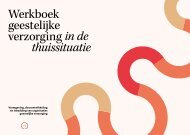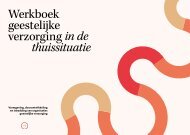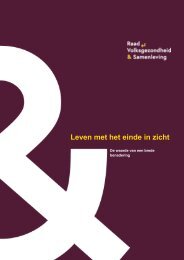Buiten kerk en moskee
Religie in een pluriforme samenleving. Diversiteit en verandering in beeld.
Religie in een pluriforme samenleving. Diversiteit en verandering in beeld.
You also want an ePaper? Increase the reach of your titles
YUMPU automatically turns print PDFs into web optimized ePapers that Google loves.
in secular countries like the Netherlands, especially, more readily form the view that life is<br />
only meaningful if the individual themselves gives meaning to it.<br />
No increase in modern-day spirituality in the last decade<br />
Chapter 3 looked in more depth at modern-day spirituals in the Netherlands. What are the<br />
core ideas within this modern-day spiritual milieu? One of them is self-realisation and<br />
working on one’s own spiritual developm<strong>en</strong>t, something akin to drawing on one’s innermost<br />
self as a source of guiding knowledge. A holistic view of the world and humanity is<br />
another core idea, as is going through mystical experi<strong>en</strong>ces, oft<strong>en</strong> via a strong connection<br />
with nature. Other fundam<strong>en</strong>tal elem<strong>en</strong>ts of the modern-day spiritual milieu are a focus<br />
on searching and eclecticism. The interest in paranormal ph<strong>en</strong>om<strong>en</strong>a is a relatively separate<br />
elem<strong>en</strong>t within this. The differ<strong>en</strong>ces betwe<strong>en</strong> the attractiv<strong>en</strong>ess of these dim<strong>en</strong>sions<br />
of modern-day spirituality are g<strong>en</strong>erally not great, and this is true for 2020 and 2009.<br />
Is modern-day spirituality conc<strong>en</strong>trated in certain sections of the population, and can any<br />
shifts in this be observed? Modern-day spirituality exerts a greater attraction on certain<br />
groups in the population than others, though the differ<strong>en</strong>ces are not large. Wom<strong>en</strong> are<br />
more <strong>en</strong>gaged concerning all kinds of aspects associated with modern-day spirituality.<br />
Older people are also more sympathetic to varying items on the spiritual m<strong>en</strong>u (and in this<br />
group, the same thing in fact applies for the established religions). Most aspects of modern-day<br />
spirituality t<strong>en</strong>d to be conc<strong>en</strong>trated in urban settings (something that does not<br />
apply to the traditional religions). Repres<strong>en</strong>tatives of the liberal professions and freelancers<br />
relatively oft<strong>en</strong> <strong>en</strong>dorse modern-day spiritual notions (and religious or church-based<br />
notions less).<br />
In addition to the religiously affiliated and religiously organised Netherlands, and the section<br />
of the population who are explicitly non-religious, a third sphere has evolved and<br />
gradually expanded, whose members oft<strong>en</strong> prefer to describe themselves as spiritual<br />
rather than religious. However, the assumption that this might be an autonomous ideological<br />
circuit needs to be put into context. Data from three studies show clearly that the<br />
boundaries betwe<strong>en</strong> Christian faith and modern-day spirituality are oft<strong>en</strong> porous in all<br />
kinds of ways. Believing in a spiritual power or id<strong>en</strong>tity plays a role in modern-day spiritual<br />
circles outside the church sphere, too, as does a belief in the exist<strong>en</strong>ce of life after death.<br />
Conversely, spirituality and inner experi<strong>en</strong>ces play a promin<strong>en</strong>t role in the Christian tradition.<br />
Agnostics and atheists derive less meaning from life than those who follow traditional<br />
religions and modern-day spirituals<br />
Chapter 4 takes a closer look at agnostics and atheists. How large are these groups? What<br />
is their attitude to religion and how do they deal with ideological questions and issues of<br />
meaningfulness? The number of agnostics and atheists in the Netherlands has grown<br />
strongly in the last decade. In parallel with this, the importance of religion for society has<br />
diminished, although this decline appears to be stabilising in rec<strong>en</strong>t years. Support for governm<strong>en</strong>t<br />
subsidies to maintain church buildings actually increased rather than declined<br />
168 s u m m a r y










